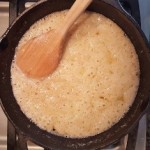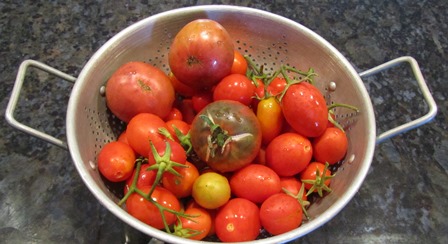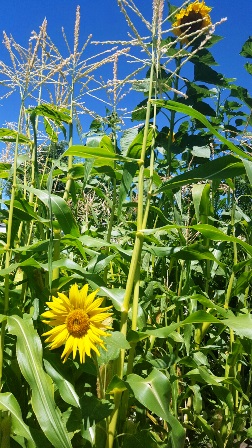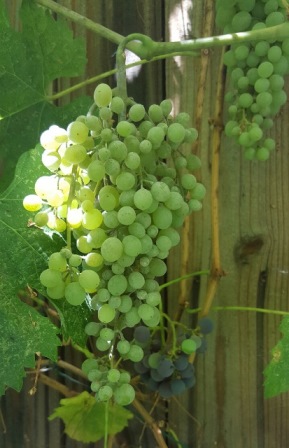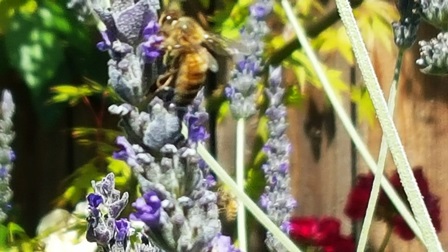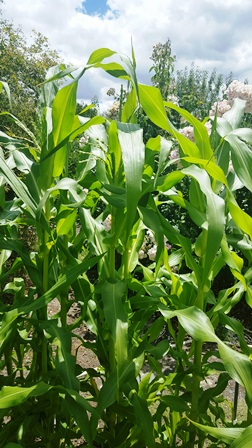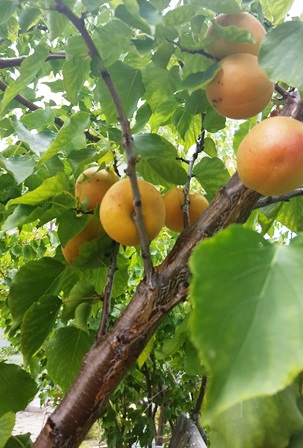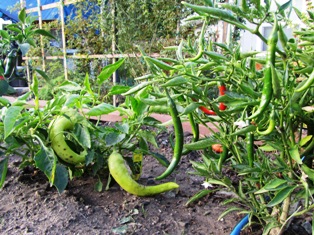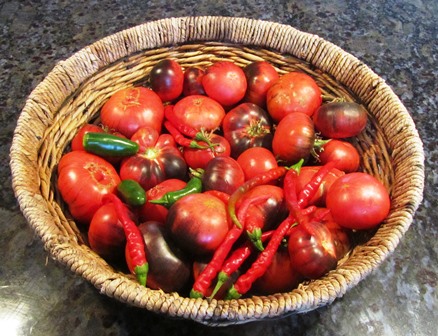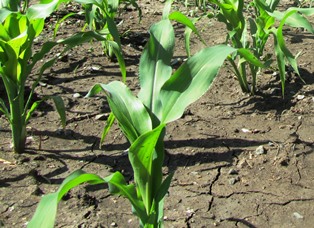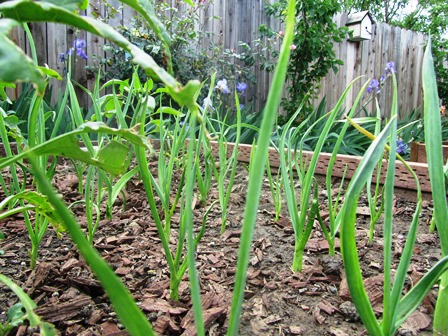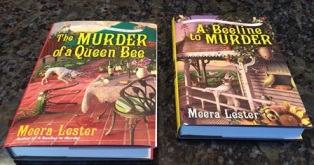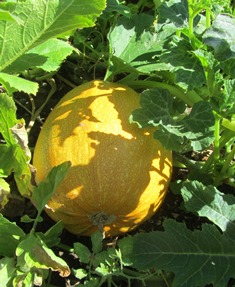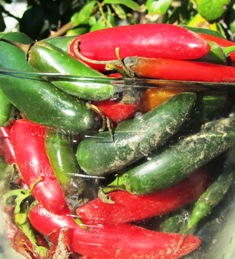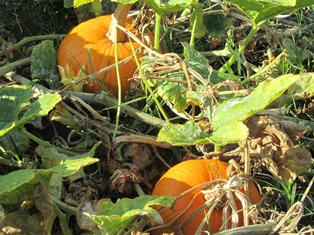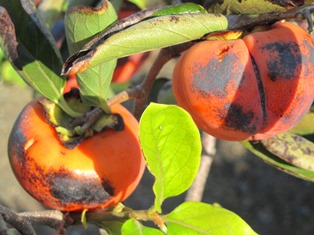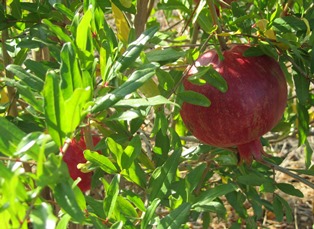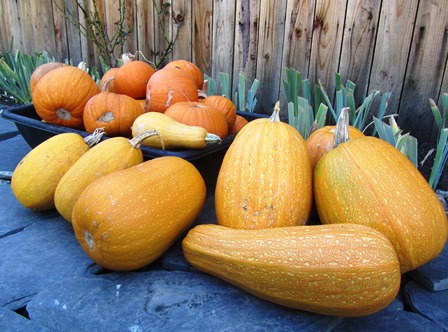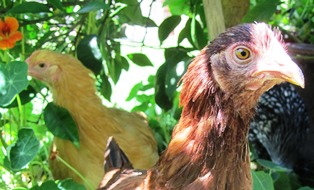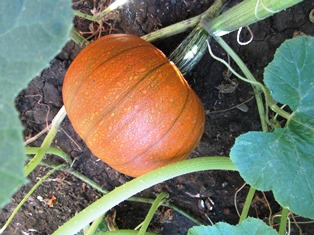Grow Something New in 2022
Seeds planted in soil trigger feelings in gardeners akin to giving birth. It’s all about birthing life in the garden. Reading about seeds is almost as good. Many of us consult seed catalogues throughout the winter in anticipation of spring planting. Often, we will stick to plants that have performed well for us.
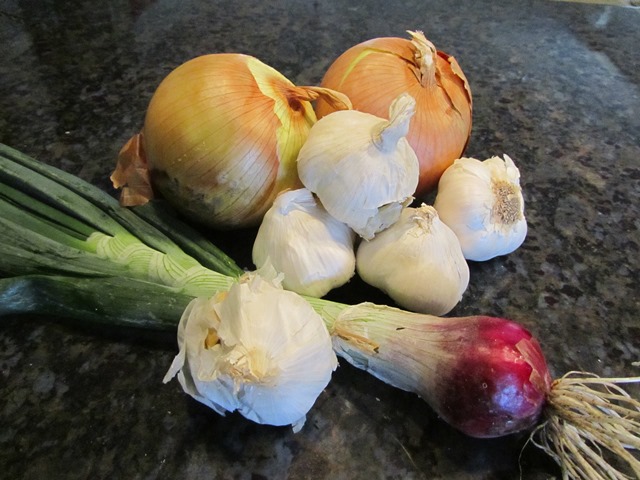
This year, I suggest trying something new, perhaps a type of heirloom cucumber known as Hmong Red, a lovely variety of squash known as Gelber-Englischer custard squash, or Zapotec Green corn. It’s doubtful you’ll find the above-mentioned seeds in your local DIY garden center. These seeds are heirlooms marketed through The Baker Creek Heirloom Seed Company, founded by Jere and Emilee Gettle, authors of The Heirloom Life Gardener.
Heirloom seeds go far beyond the heirloom tomato and other vegetables offered at local DIY outlets and garden centers. And Baker Creek isn’t the only seed company with a catalog and shops that sell heirlooms. But they’ve worked very hard at making the Baker Creek name synonymous with the grow-your-own-food revolution that focuses on seed not altered by scientists. In other words, the seed has not been genetically modified (GMO).
Thousands of types of heirloom vegetable seeds are available when you know where to look for them. Search for catalogues online. Among others, check out: https://www.seedsavers.org/catalog, https://www.rareseeds.com, and https://www.edenbrothers.com/store/heirloom_seeds.html
Celebrating the Fourth–Hankering For Nostalgia
On the farm where I grew up in central Missouri, we celebrated the Fourth of July with a fish fry. We caught blue gill, bass, crappie, and catfish in my grandfather’s stocked ponds or from nearby Perche Creek.
After my brother, cousins, and I played games until dark and then chased fireflies, my grandmother would set out dessert–a simple blackberry pie, shortcake and berries with homemade ice cream, or a pineapple upside down cake. A grownup would surprise us kids with sparklers that we would light and wave as we ran around in the dark.
Feeling nostalgic for those old days and ways of celebrating, I’m going to shuck and cook corn on the cob and grill some salmon with fresh veggies from the garden for this–our eighth celebration of this holiday on the farmette. There’s a ton of summer squash that I’ll douse with olive oil and sprinkle with seasoning before grilling.
For the salmon, I make a easy-peasy mango-lime-cilantro salsa. Chop red onion and red and green bell pepper. Cube slices of fresh mango. Take a handful of cilantro that’s been tightly rolled and chop it into ribbons. Mix everything together, sprinkle with sugar, and generously drizzled with fresh lime juice. Serve well chilled over the grilled salmon.
I’ve already whipped up a pineapple upside down cake and baked it in my 10-inch cast iron skillet. To save time, I used a yellow cake mix and added a dash of rum and pineapple juice for flavor. Recipe is below.
QUICK PINEAPPLE UPSIDE DOWN CAKE
Ingredients:
1/2 cup plus 2 Tablespoons butter
1 1/4 cups sugar
7-8 slices of canned pineapple
7-8 maraschino cherries
1 box yellow cake mix
1 Tablespoon dark rum
1/8 cup pineapple juice
Directions:
Preheat oven to 350 degrees Fahrenheit
In a cast iron skillet over medium heat, melt the butter. Add the sugar and stir until the sugar turns light brown (roughly 5 to 7 minutes). Remove from heat. Carefully lay in the pineapple slices. Place a cherry in the center of each fruit ring.
Make the cake according to directions on the box. Add the rum to the batter. Pour over the pineapple slices in the skillet.
Place the skillet on the middle rack in the oven and bake the cake at 350 for 30-40 minutes. Guard against over browning of the top. If necessary, lay a layer of aluminum foil over the cake near the end of the bake time. Use a knife around the cake edges to loosen from the skillet. Turn upside down onto a cake plate. Enjoy.
_______________________________________________________________
If you’re interested in farmette topics and storytelling, check out my Henny Penny Farmette series of mysteries. All three books in the series are available in numerous formats and can be ordered from Amazon, Barnes and Noble, and elsewhere online as well as from traditional bookstores everywhere.
These cozy mysteries make great summer reading and they include delicious recipes, tips for keeping bees and chickens, and facts and tidbits about growing heirloom vegetables and herbs.
Please see more at http://tinyurl.com/ya5vhhpm
What’s Growing in the July Garden?
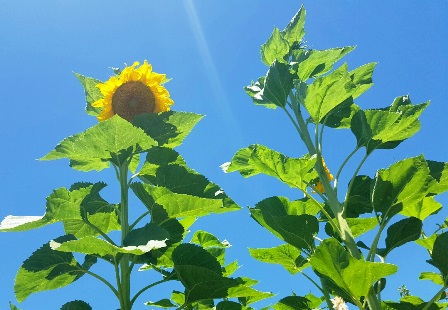
Sunflowers are native to North America and were taken to Europe in the 16th century; however, they date back to roughly 3,000 B.C. Honeybees love sunflowers.
Towering above the squash and lavender in my garden are rows of green corn stalks bearing ears of sweet, plump kernels. Snaking along the rows at the base of the cornstalks are vines laden with butternut squash and Armenian cucumber.
There are ripe tomatoes, too, especially the prolific heirloom–Red Beefsteak. I love cutting up some of these fresh, thin-skin tomatoes and combining them with basil, olive oil, grated cheese, and pine nuts as a topping for pasta. Add some grilled, seasoned chicken and you’ve got a quick and delicious summer lunch.
Zucchini and yellow squash sport large, showy blooms and are producing like crazy this month. While you can harvest and eat the blooms, we prefer the squash. Zucchini is delicious grilled or tossed with rosemary potatoes and onions or made into a French lentil and tomato salad (see recipe from last week’s posting).
Growing on vines trained over a wall and on supports, the green table grapes are beginning to swell. The taste is still a little tart, but will sweeten with the passage of another couple of weeks.
* * *
If you enjoy reading about farmette topics (including gardening, beekeeping, and delicious recipes), check out my cozy mysteries A BEELINE TO MURDER and also THE MURDER OF A QUEEN BEE in the Henny Penny Farmette series (from Kensington Publishing).
These novels are available through online retailers such as Amazon, Barnes & Noble, Kobo Books, and Walmart as well as from traditional bookstores everywhere.
Now available in mass market paperback, this debut novel launched the Henny Penny Farmette series of mysteries and sold out its first press run.
COMING SOON: The second cozy mystery in the Henny Penny Farmette series, available Sept. 29, 2016
Time Spent in a Potager Garden Renews the Spirit
With the official start of summer a few days away, I find myself leaving my computer and the scene I’m writing on my third novel to take a break in the garden. Alive with honeybees, bumblebees, butterflies, and hummingbirds, the garden is perfect place for a respite and a cup of tea.
Quite like a potager garden that includes flowers, herbs, trees, vegetables, berries, and grapes, mine also includes a patch of corn.
Embroidered around the edges of the garden, there are climbing roses, fruit trees, and lots of lavender. Along the rows of lavender, there are peach trees with fruit the size of softballs and five pomegranate trees, laden with blooms and new fruit.
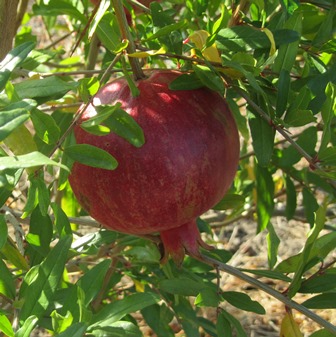
The pomegranates aren’t quite this large yet, but the trees have so much fruit, they’ll have to be thinned.
As I meander, I discover the trees of red and yellow plums have begun to drop their ripe fruit. I’ve got to make those plums into jelly or jam and ditto on the apricots.
But that work will have to wait until my late afternoon tea break. My novel won’t write itself. Still, the time I spend in the garden revitalizes my spirit and refreshes my brain cells, enabling me to return to the computer and the scene I’m writing with renewed vision and vigor.
* * *
If you enjoy reading about gardening, keeping bees, raising chickens, and creating delicious recipes, check out my novels from Kensington Publishing.
The Henny Penny Farmette series of cozy mysteries are available at Amazon, Barnes and Noble, Kobo Books, Walmart, and other online and traditional bookstores everywhere. Available in hardcover, Kindle, and mass market paperback formats.
Planting the Spring Garden
Winter brought us lots of rain and now the ground has warmed up and is ready to receive the heirloom seedlings of our favorite vegetables and herbs.
Tomatoes won’t set fruit until the nighttime temps hover around 55 degrees Fahrenheit, but I tucked in several seedlings of heirloom varieties (Bradley, Cherokee Purple, and Red Beefsteak). Victory Seeds offers a nice selection of open-pollinated, non GMO, rare heirloom seeds for a variety of tomatoes. See, http://www.victoryseeds.com/tomato.html
While I was digging, my neighbor’s bees decided to swarm. So I stopped gardening to check on my own bees. They’ve been humming like a truck engine, and there has been a lot of bee traffic. Concerned that they might swarm, I set aside my shovel and got out the swarm catcher, the lemon oil, and the hand pump sprayer. I positioned the swarm catcher in a tree across the yard, sprayed the tree with lemon oil, and went back to gardening.
I’ve readied a patch of ground for the sweet corn, squash, peppers, and beans. Also, in a large-size planter pot, I’ve tucked in flat Italian parsley, Italian oregano, dill, chives, and sweet basil. The patio pot will remain near the kitchen slider in full sun so I have culinary herbs at the ready when I need them.
The early sweet peas are taking off now and the garlic and onions I put in the garden last fall are about a foot high. The vegetables and herbs I plant now will provide me with plenty of nutritious offerings right up until late fall–one of the many reasons to plant a garden in spring.
Enjoy this blog? Check out my Henny Penny Farmette novels, available online and in traditional bookstores everywhere.
Visit a Farm in the Fall For a U-Pick Experience
The Henny Penny Farmette is about a half hour away from Brentwood. There are at least fifty farms in and around Brentwood that offer families a U-Pick experience. The city is located in the eastern region of the San Francisco Bay Area.
Although Brentwood has had a post office since 1878, the city today is largely residential. That said, there are many actively producing farms and preserved lands around the pockets of community. The area has a semi-arid, Mediterranean climate and is situated on the alluvial plain of the Sacramento-San Joaquin Delta.
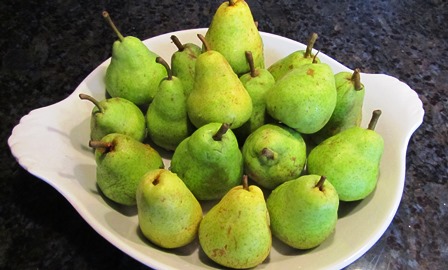
To bring out the maximum sweetness of pears, place them in a paper bag for two days in a kitchen cupboard
Many of the farms permit family picking of produce and tree crops. Some of the crops available for picking through October include apples, corn, figs, green beans, onions, peppers, pears, persimmons, pomegranates, pumpkins, squash, strawberries, and tomatoes. Additionally, walnuts, pistachios, and almonds are available year-round at some of the farm stands. There are also wineries and vineyards in the region.
As you drive around the area, look for a Brentwood Harvest Time sign as an indicator for a farm. There will be a number on the sign that coordinates to a name of a farm with that same number on a handily map that you can get at http://www.harvest4you.com. In July, the city hosts a harvest festival for the entire family. It features tractor rides and corn shucking and eating contests, among other activities.
Finally, if Christmas at your house wouldn’t be the same without a live tree, you can find Christmas tree farms in and around Brentwood as well on the Harvest4you.com website. Check it out.
U-pick guidelines as listed on the map include the following rules.
1. No climbing or damaging trees
2. Children are not allowed on ladders.
3. You must buy what you pick.
4. Check produce for ripeness before picking it.
5. Do not throw fruit.
6. Do not litter.
Garlic–A Staple of Any Kitchen Garden
No proper kitchen garden would be without a section for onions (whether spring green onions, chives, or bulb onions) or garlic. Both kitchen staples are easy to grow. In several raised beds measuring four feet by six feet, I’ve planted garlic amidst a few jalapeno pepper plants. Garlic benefits other plants in the garden as well.
BEST TIME FOR PLANTING
In spring, after all danger of frost has passed, plant garlic cloves. Or, plant in late fall when you might be planting other types of bulbs. Some European gardeners swear that garlic must be planted on the shortest day of the year, the winter solstice.
I planted my garlic in late February/early March, long before my tomatoes, eggplant, pumpkin, and squash (the heat lovers) went in. The green garlic tops shoot out of the soil quickly and grow fast.
HOW TO PLANT GARLIC
Plant each clove from a bulb upright in soil roughly one-inch deep. Space the cloves four-inches apart. The growing site must receive full sun. Give the garlic a good watering each week. Garlic is a beneficial companion plant in the garden because of allicin (a property that acts as a fungicide and pesticide), especially when planted near lettuce and cabbage where it will deter aphids.
HOW TO HARVEST AND STORE GARLIC
When the tall green shoots of the garlic become dry and turn brown, it’s time to harvest the garlic bulbs. After you’ve pulled the bulbs out, shake off the dirt (never wash) and then hang the bulbs in a dark, dry place. Then when the bulbs are completely dry, you can braid the paper-dry tops to hang the garlic in the kitchen for easy access.
Finding Surprises in my December Garden
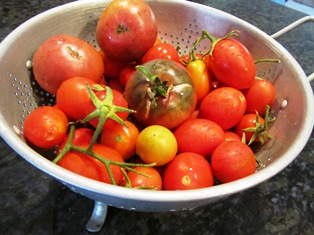
Open-pollinated, heirloom tomatoes produced lots of tasty fruit over the summer, but . . . in December?
It’s the second week of December and the Winter Solstice is about to arrive next week. Walking through the bleak garden landscape, I wasn’t expecting any of my summer plants to still be producing. But surprise, surprise.
A cluster of red grape tomatoes were still clinging to a vine that had become overgrown by weeds. Not only was fruit still hanging on the vine, but the plant was setting up new blooms. I can only assume the reason for that is that we’re having unseasonably warm temperatures in the Bay Area.
I harvested a 10-pound bag of red and yellow onions at summer’s end. Now I’ve got a new bed where the onion heads re-seeded. I do hope these bulb onions make it through to spring. I might just build a cold frame over them.
In raised beds, the jalapeno and Thai chili peppers that wilted and drooped during the terrible drought this summer have responded to recent rains with lots of ripe peppers and also new blooms.
It’s very strange as these babies need water and high heat; our Bay Area temperatures are hanging in the 60s Fahrenheit during these early days of December.
I harvested the pumpkins and squash but hadn’t yet pulled out the old vines for composting. The hard-skinned pumpkins and squashes can be peeled, cut into cubes, and frozen for use later in culinary creations such as soup.
Further on, I picked the last of the persimmons and pomegranates. These are my favorite fall fruits. And if you’ve ever dropped ripe pomegranate seeds onto the ground, you’ll soon see that the chickens love them, too.
Having uncovered all the garden’s surprises, my thoughts turn to how I’m going to lay out the garden next year and which heirlooms to grow. The garden soil needs to rest as we Bay Area gardeners welcome the rain now that the Pacific storm door has finally opened.
Pumpkin and Squash–Dealing with Vine Sprawl
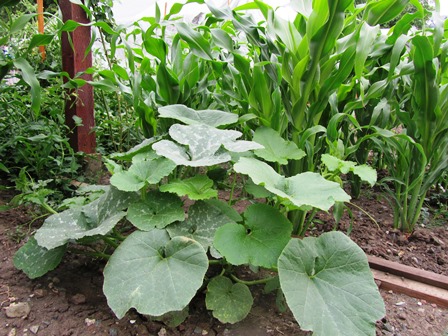
A squash plant will grow well in small gardens on supports such as a teepee of three poles tied together or on a fence
With the California drought looking like there’s no end in sight, I began pulling what I could from the garden. A lot of the space was taken up this year with squash and pumpkins. Vines are everywhere.
It’s my own fault for not keeping a better control over the direction of the vines. I could have grown them up and over a support, but I didn’t. Once ignored,the vines took over the whole garden, more than 25 to 30 feet in almost every direction.
I grew mainly heirloom varieties of squash and the French sugar pumpkins. One pumpkin plant reseeded from last year. Those vines climbed up into the five heirloom tomato plants, two apricot trees, and headed out toward the Lady Banks Rose and the Climbing Sally Holmes roses that border the garden. Inching even further, the squash vines moved out of the garden into the back yard.
No doubt about it, I’m going to have to pull on work gloves and a straw hat and get out there to dig out those dried vines and pull them out. Next year, trellises and supports for everything. Water is a commodity in crisis right now, at least in this state and everyone has to do their part. We’re just going to harvest the squash and pumpkins early and pray for early rains.
Butternut Squash and French Sugar Pumpkins Takes Over the Garden
My organic vegetable garden is a mess of vines. Among the varieties of heirloom tomatoes, Armenian cucumber, summer squash, and eggplant that I planted in late spring, I also tucked in my favorite Butternut squash and French sugar pumpkins. The vines, although producing prolifically, have taken over. I can hardly get in to pick the tomatoes and I can’t see my chickens for the vines.
Next year, I’m going to try Bush Buttercup from Baker Creek Heirloom Seeds. The squash has the same orange flesh and firm rind but grows on bushy plants that say compact and grow between three and four feet high. The fruits weigh three to four pounds.
And maybe, with permission of my neighbor who has a large growing area adjoining our property I might plant Boston Marrow (first documented in 1831). That orange-fleshed squash can weigh up to 15 pounds. A native American tribe distributed the seed to settlers in New York and from there, the seed went to gardens in Massachusetts and spread elsewhere.
Another squash from that Baker Creek Seeds that I’d like to growl is Iran. Collected in Torbat-e-Heydariyeh, Iran in 1940 and preserved at the United States Department of Agriculture since, this is one of the loveliest of the ornamental squash. Orange color mottles its sea-foam green rind.
The pumpkins in my garden are Rouge Vif D’Etampes. I grew these with great success last year and saved the seed of this old French heirloom. A variety of seed companies carry this seed, including Baker Creek Seeds that notes it was one of the “most common pumpkins in the Central Market in Paris in the 1880’s . . . can be picked small and fried.”I like this one especially for pie making.
Squash and pumpkins taste great in Italian, Mexican, French, Middle Eastern, and American recipes. Rich in flavor and nutrients, squash and pumpkins can be made into soups, breads, mixed-vegetable dishes, and pies or can be baked, boiled, steamed, or fried. Even the blossoms are edible. So, it should be apparent why I need more room in my garden. Now to figure out how to keep it orderly.
 Facebook
Facebook Goodreads
Goodreads LinkedIn
LinkedIn Meera Lester
Meera Lester Twitter
Twitter






